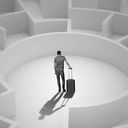What it takes to get home when you lose your passport abroad

Earlier this month, I was robbed of my passport and luggage, near the end of what was supposed to be a week in Sicily. The next several days were a lesson in how the U.S. government fails its citizens stuck overseas, particularly those with scant financial resources.
Why it matters: A system reliant on paperwork, fees and in-person appointments — in a world where more secure, more efficient digital alternatives exist — makes life all the harder for Americans who haven't done anything wrong.
Backstory: The beach was to blame. It was gorgeous and mostly empty, along the side of a dirt road. My girlfriend, Kristen, and I pulled over, locked the rental car and went for a swim.
- We took our wallets and phones to the beach, but left our passports in the locked car, given Italy's problem with pickpockets.
- All seemed fine when we returned to the car, until an hour later when we stared slack-jawed into the empty trunk. Turns out a door lock had been picked.
- We found Kristen's tote bag in a nearby dumpster, with her passport and credit cards still inside. All they'd wanted was her cash and AirPods. But our two small suitcases were gone — including the one with my passport.
We'd planned to fly home the next morning. Since Kristen still had her passport, and last-minute, one-way tickets are crazy expensive, she went ahead. The closest U.S. consulate where I could obtain an emergency passport was a six-hour drive (plus a ferry ride) away. And it was closed until Monday.
- I tried everything I could think of to get home before then. I had a photo of my passport, a driver's license and a police report. I called my congressperson's office. I got approval to fly from Italian border police and also got a border-patrol agent in the U.S. on the phone, to assure Delta's gate agents that I’d be allowed back into the country if they let me board a plane. They didn’t.
- By the time I finally gave up, booked a cheap hotel room and convinced different Italian border police to let me leave the airport without a passport, I was out about $2,000, not accounting for replacing any of the things that had been stolen. Which, I realized, I should probably do, as I’d been wearing the same clothes since dumpster-diving two days earlier.
The big picture: I'm financially privileged enough to afford these unexpected costs, including the loss of a normal workday. But not everyone is in my situation, and their government leaves them hanging.
- There were about a dozen other people in need of emergency passports once the U.S. Embassy in Rome opened on Monday morning.
- One of them was a young woman who'd been robbed of her passport, phone and credit cards. She had no means with which to pay the nearly $200 it costs to get an emergency passport — let alone the cost of getting stranded in Italy if she wasn’t able to get a passport in time.
- Some of us waiting stepped up to cover her fees.
When I asked the U.S. State Department about why things work this way, especially for people like the woman without money, a spokesperson pointed me to this webpage, which says the fees may be waived in some "extraordinary circumstances," and the government does sometimes provide loans to those without travel funds.
- But none of that information was posted in the room, nor did we hear it mentioned, nor could we have looked it up ourselves: Cell phones, for those who still had them, had been confiscated upon entry.
The bottom line: The embassy staffers in Italy were courteous and professional. They ultimately got me my emergency passport in just one hour (it's purple!), enabling me to fly home late Monday night. Kristen met me upon arrival.
- But they also were relying on antiquated systems that didn’t seem to involve any of the cameras or facial recognition software familiar to anyone who’s boarded an international flight from a U.S. airport.
- When it wants to, the U.S. government can quickly and accurately verify the identity of people who wish to enter the U.S. But it doesn’t put those tools to use to help out Americans stranded abroad, who instead are asked to travel long distances to buy new passports — no matter how difficult that may be.